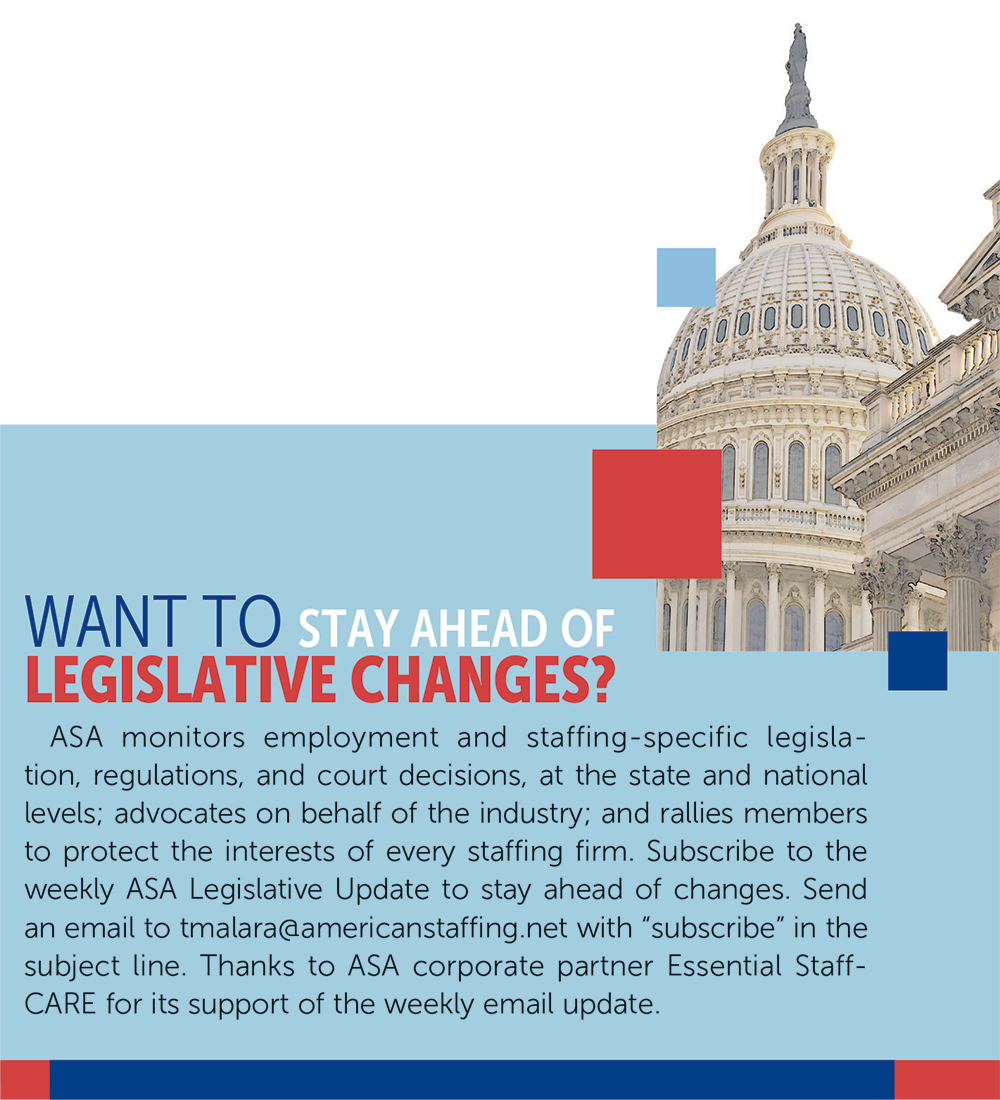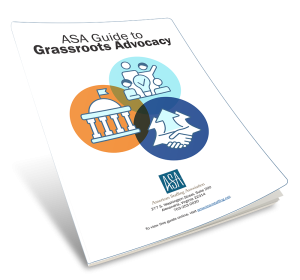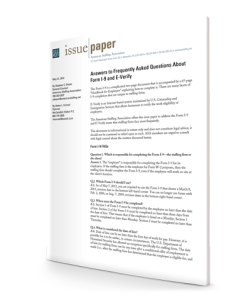staffing companies.
While the start of 2021 ushered in plenty of change in Washington, DC, the same could not be said when it came to state capitols across the country. On the federal level, president Joe Biden took the oath of office on Jan. 20, giving Democrats control of the White House and Congress for the first time in over a decade. Republicans fared far better on the state level, where they managed to increase their hold on governorships and state legislatures. But across the country, the agendas of policy makers at all levels remain
largely focused on the Covid-19 pandemic. >>>
The American Rescue Plan. President Biden’s first major legislative initiative, known as the American Rescue Plan, was the fourth major Covid-19 stimulus package in less than a year. While a bipartisan agreement proved to be out of reach, Congress passed this $1.9 trillion bill into law through the budgetary process known as reconciliation, which requires only a simple majority vote. Among other things, the American Rescue Plan:
- Extends available tax credits to eligible employers who provide emergency Covid-19-related paid sick and family leave to employees through Sept. 30, 2021; it also expands the qualifying reasons for taking leave to include getting vaccinated
- Extends until Dec. 31, 2021, the expanded Employee RetentioCredit, which was set to expire July 1
- Extends the federal pandemic unemployment insurance benefit of $300 per week through Sept. 6, 2021
- Provides new COBRA subsidies which cover 100% of COBRA premiums for employees and other qualified beneficiaries who have lost their health insurance due to ainvoluntary terminatioof employment or reductioihours
- Expands the availability of premium tax subsidies under the Affordable Care Act
ASA has published issue papers that discuss both the new federal COBRA subsidy and the expansion of ACA subsidies.
The American Jobs Act. Shortly after passage of the American Rescue Plan, president Biden introduced a broad, wide-ranging infrastructure bill known as the American Jobs Act. While this $2 trillion bill contains many traditional infrastructure projects—such as repairing and upgrading highways, bridges, streets, and tunnels, and modernizing the country’s electrical grid system—it also contains projects such as expanding long-term care under Medicaid and enacting the pro-union Protecting the Right to Organize (PRO) Act, that critics claim have nothing to do with infrastructure. Republicans have countered with their own $700 million infrastructure plan, aimed mostly at transportation projects.
As with most massive legislative projects, the biggest question appears to be, “How are we going to pay for it?” Democrats are looking at targeted tax increases on corporations and the wealthiest Americans, while Republicans support the creation of user fees to pay the bill. The White House continues to stress they prefer a bipartisan bill, but House and Senate leaders are preparing once again to proceed through the expedited budget reconciliation process.
Tracking State Legislative Activity
Due to the pandemic, many state legislatures were forced to adjourn prematurely last year, putting their legislative objectives on hold. Those that enacted legislation primarily focused on Covid-19-related issues. While legislatures continued to focus on the pandemic during the first half of 2021, various labor and employment bills unrelated to the pandemic were introduced in some states. The following summarizes ASA’s state legislative activities to date.
Nevada—Ban on Construction Staffing. Legislation that threatens staffing interests, both legally and operationally, has been signed into law in Nevada. The law bars Nevada construction contractors from using staffing agencies to provide skilled labor such as electricians, carpenters, and drywall hangers. Unskilled labor (e.g., cleanup workers) is not affected.
Nevada unions successfully lobbied for the legislation (AB 227), ostensibly to address worker misclassification and other abuses—and to prevent the loss of millions in state revenue due to unpaid
employment taxes. But the real motive, we suspect, is to take jobs from staffing agencies so the unions can fill them through their hiring halls and recruit them for membership.
ASA hired a top Nevada lobbying firm and marshalled a coalition of affected Nevada staffing agencies and contractors in a grassroots campaign to oppose the bill. In letters, issue papers, testimony, and meetings, we argued the bill would destroy thousands of jobs provided by staffing agencies that are not engaged in the abuses cited by the unions. Staffing agencies are licensed as private employment agencies (PEAs) under Nevada law and thus are required to pay the employees’ wages, withhold and remit payroll taxes, provide workers’ compensation insurance, and issue W-2s. At ASA’s urging, veterans and minority groups joined in opposing the bill.
Our efforts raised substantial bipartisan concern in the minds of legislators regarding the need for the bill and the harmful impact on staffing firms and their contractor clients. But unions hold such sway in the state that the bill passed the Democratcontrolled legislature on straight party line votes and was signed by Gov. Steve Sisolak.
The law violates a fundamental industry principle and longstanding ASA position—that the business of staffing is separate and distinct from the business of clients and that staffing agencies are not subject to the laws applicable to a client’s business merely because the agency supplies employees to that business. Accordingly, we plan to challenge the law in court.

Washington State—Workplace Safety. In April, Washington Gov. Jay Inslee signed a new law addressing temporary worker safety in the construction and manufacturing industries. The law requires host employers to review the safety training provided by staffing agencies, document and inform staffing agencies about the site-specific hazards temporary workers may face, and train temporary workers on any such hazards. If a temporary worker’s job tasks or work location change, posing new hazards, the host employer must inform the staffing agency and employees and provide updated training and personal protective equipment, as necessary.
The law also makes clear that staffing agencies must inquire about the work site employer’s health and safety practices and job hazards prior to placement of temporary workers. In the event a staffing agency becomes aware of job hazards that are not mitigated, it must make the host employer aware and, if the hazards are not corrected, remove the workers from the assignment.
The law was drafted by the Washington State Department of Labor and Industries (L&I). Given that passage was all but certain, ASA, its lobbyist, and members of the ASA employee safety committee
worked with L&I to remove unnecessary and overly burdensome requirements.
ASA also was engaged in important workplace safety litigation, arguing in May before the state Supreme Court in a case brought against a staffing agency by L&I. L&I contends that the
staffing agency should be liable for workplace injuries suffered by a temporary worker at the client job site, while the agency claims it should not be liable because it took reasonable steps to protect its workers. ASA argued that L&I effectively is trying to impose a strict liability standard that would hold staffing agencies liable for work conditions and incidents over which they have no control and irrespective of the steps they took to protect the workers. The court’s ruling is expected later this year.
Rhode Island—Strict Liability. Advocacy by ASA and the Rhode Island Staffing Association helped persuade state lawmakers to put legislation on hold that would have imposed new burdens on staffing clients.
Rhode Island bill S 139 would have made any organization that uses temporary labor automatically liable for staffing agency wage violations. ASA and RISA submitted testimony arguing that the bill was unnecessary because staffing clients have long been responsible as joint employers under a wide range of federal and state labor and employment laws. A coalition of Rhode Island businesses also objected to the bill, arguing that it would penalize users of contract labor even if they had no knowledge of any violation of the wage payment laws.
Faced with unified business opposition, the senate labor committee referred the bill for study, effectively killing it for the year.
Connecticut—Predictive Scheduling. Following a pattern seen in multiple states over the last several years, Connecticut SB 668 requires that certain types of employees—including certain workers in the mercantile trade, in restaurant occupations, and in hotels or long-term health care services—be provided with advance notice of their work schedules. Such workers would be entitled to additional pay if they are not notified in a timely manner that a shift has been cancelled or that their work hours have been reduced. The legislation also prohibits certain businesses from using temporary and other workers supplied by third parties, including staffing firms, unless such businesses first offer additional work to their existing employees.
ASA and its lobbyists (Powers, Griffin & Hill) opposed the bill because it could impose onerous administrative burdens on staffing firms and limit opportunities for temporary workers. Trade associations representing restaurants and retailers argued that, on top of the many issues they have with the legislation, passing a bill aimed at two of the hardest hit industries during the pandemic just as they are starting to recover would kill many businesses and cost hundreds of employees their jobs.
At press time, the future of this bill was uncertain. The bill has passed the Senate, but the governor has yet to announce his intentions and House leaders seem reluctant to bring it up for a vote. The legislature adjourns for the year on June 9.
Illinois—Progressive Discipline. Working with ASA lobbyist Paul Rosenfeld of the Government Navigation Group, as well as members of the Illinois Search and Staffing Association, ASA was able to stop further consideration of a bill that would mandate how employers discipline and discharge their employees, and require severance pay for discharged workers.
Among other things, Illinois HB 3530 and SB 2332, the Illinois Employee Security Act, would
- Prohibit aemployer from discharging aemployee without “just cause”
- Require employers to use “progressive discipline” as a conditioof just-cause discharge
- Penalize employers for discharging employees without progressive discipline/just cause
- Require severance pay for discharged employees
ASA met with the House bill’s lead sponsor, Rep. Carol Ammons, and several proponents of the bill to discuss our concerns. During the meeting we explained that while we agreed that no employee
should be terminated without explanation, we were concerned that the legislation would create an undue burden on employers that could adversely affect job creation.
Faced with fierce opposition from the entire Illinois business community, House and Senate leadership sent the bills to committee for further consideration, meaning that neither will be enacted this year. If the bill becomes a topic of further study during the summer, ASA will continue to meet with lawmakers to explain our concerns.
Toby Malara, Esq., is government affairs counsel for ASA. Send feedback on this article to s******@americanstaffing.net. Engage with ASA on social media—go to americanstaffing.net/social.



